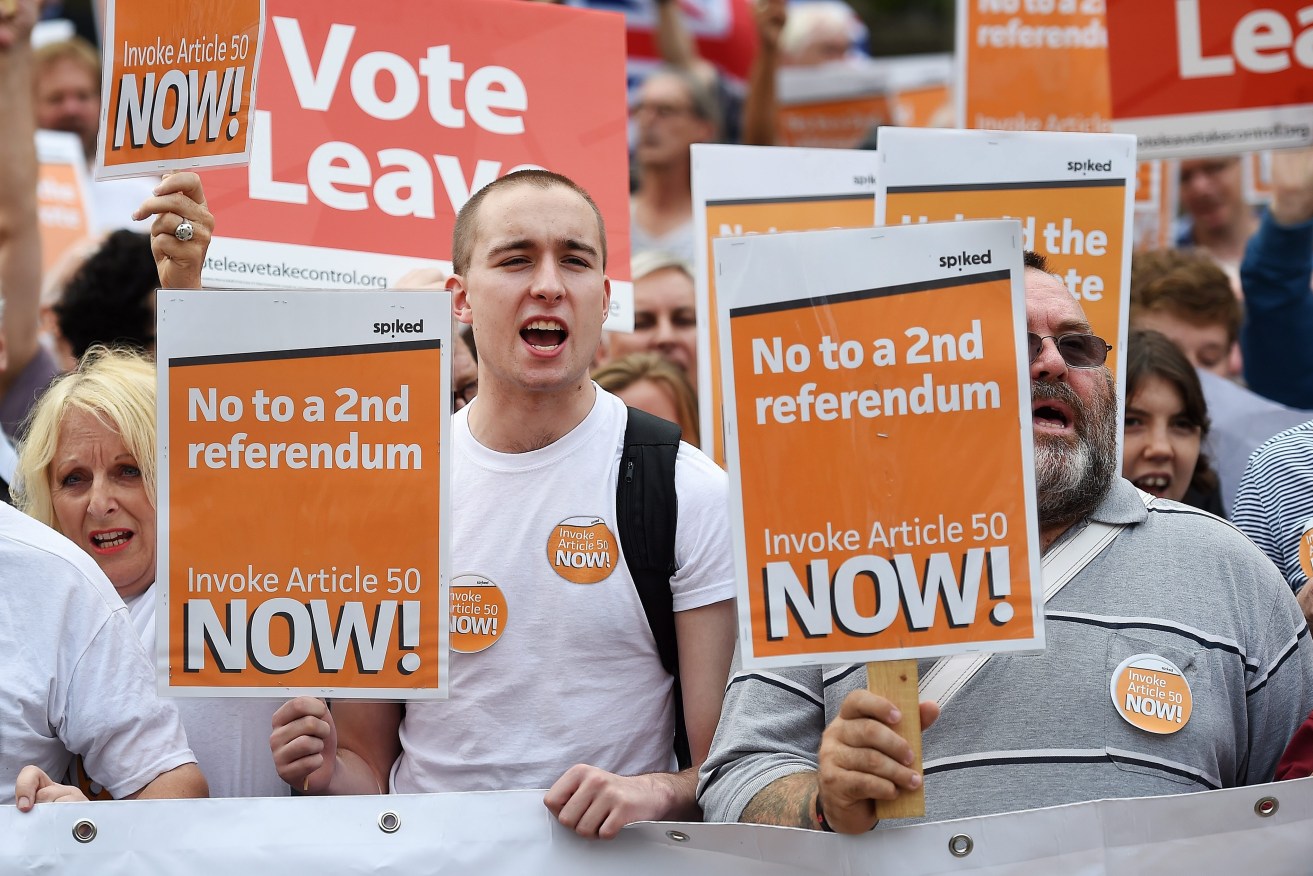Citizens’ jury designer says Govt has “stopped listening”
The head of the organisation that designed South Australia’s nuclear citizens’ jury process has hit out at the State Government, saying it has stopped listening to its community and has failed to heed the lessons of Brexit.


Lessons not learned? A protest by pro Brexit supporters. Photo: EPA/Andy Rain
Luca Belgiorno-Nettis, the founding director of the not-for-profit newDemocracy Foundation, says the Government should not ignore the deliberations of the jury, which produced a majority report opposed to a continued exploration of a high level nuclear waste dump for South Australia.
He slammed Premier Jay Weatherill’s concept of a referendum to settle the question, describing referendums as part of a democratic system that was failing to produce social cohesion.
The citizen’s jury report came after the Scarce Royal Commission recommended further consideration of the economic opportunities it believes could flow from a nuclear waste facility.
In response, Weatherill, a strong supporter of the citizens’ jury process, surprised many by proposing a referendum, at some distant point in the future.
That decision has provoked a stinging response from Belgiorno-Nettis.
In an opinion piece published by Fairfax Media today, Belgiorno-Nettis paints a glowing picture of the much-criticised jury process, which brought together 350 people to consider the nuclear question – the biggest citizens’ jury ever run in Australia.
“From the time the royal commission report was handed down earlier this year, the South Australian government has been trying to listen, very carefully, to its community,” he says.
“But now it has stopped listening, even after the citizen jury concluded their deliberations. A referendum has now been floated as a way to finally determine the question; never mind the most recent lessons from the Brexit experience. The jury tried to find common ground. A referendum won’t.
“Should the South Australian Premier, Jay Weatherill, proceed with a referendum, the government could at least do what Oregon does: append the jury’s findings to the ballot paper.
“The jury’s considered decision should not be ignored by the government. The greatest underused asset in politics today is the common sense of everyday people – when they deliberate.”
The trenchant defence of the process comes two days after newDemocracy Foundation executive director Iain Walker indicated to InDaily that he believed there were some issues with the jury process.
Walker was responding to concerns about the second citizens’ jury raised by the nuclear royal commission’s Consultation and Response Advisory Board, which found that the scale of the jury “was, in the Board’s view, unprecedented and proved problematic as well as highlighting issues concerning witness selection and management”.
The board’s official report on the process also “notes and observed… some public criticism of the selection of witnesses on economic issues at CJ2”.
In relation to a minority report presented at the end of the jury, the board says “that there was some concern expressed as to the experience of some jurors attempting to influence others by putting pressure on them during the writing of this report”.
In response, Walker said “the themes you broadly raise (the concerns raised in the Consultation and Response Advisory Board report) – time will bear out that we don’t strongly disagree”.
“Groups of 50 work really well; groups of 350 have a different social dynamic.”
Belgiorno-Nettis today extolled the virtues of the process.
“If one acknowledges that democracy is principally about social cohesion, then elections – and referendums – are failing us miserably,” he wrote. “Citizen juries in Australia, and around the world, show how we can do democracy more productively, and more collaboratively.”
The State Opposition this week announced its opposition to the high level nuclear waste dump proposal.
Weatherill responded to the criticism today by saying that he wanted the community to decide the state’s nuclear future – not political parties.
“The citizens’ jury has been an important part of the state’s largest ever public consultation process,” he said in a statement.
“The jury’s findings have helped guide the Government’s response.
“A key finding of the jury was the importance of listening to Aboriginal communities. In response, the Government has stipulated local Aboriginal communities will be given the right of veto over any future project.
“Above all, the jury’s key concern was about trust.
“In response, the Government has decided the only path forward is to put its trust in the people of South Australia, and secure broad social consent through a state-wide referendum.
“We want the people to decide, not political parties. Of course, before a referendum can be considered, bipartisanship needs to be restored.”
newDemocracy should not be confused with DemocracyCo – an Adelaide company which helped to run the citizens’ jury, but did not design the process.




